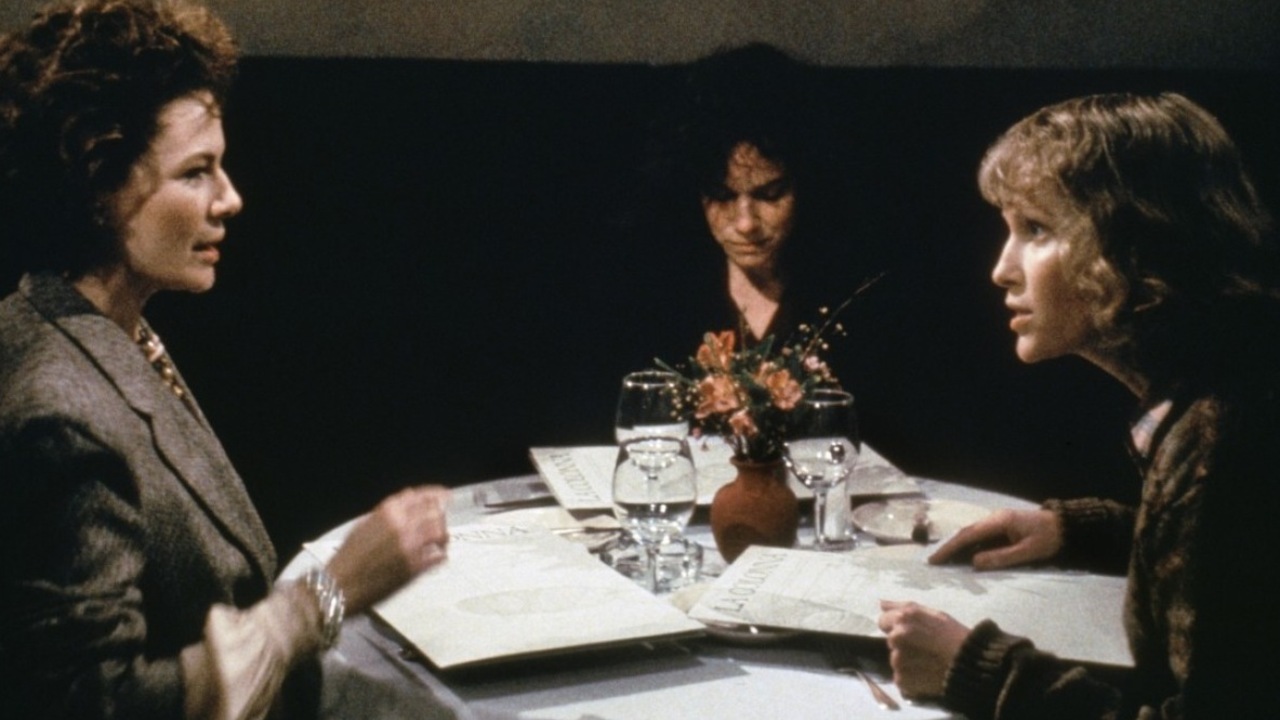
The 14th film written and directed by Woody Allen
Woody Allen returns to modern day NYC for the first time since Manhattan (1979) with this, one of Woody Allen’s most loved films. A sprawling, rambling tale of three sisters who live in New York, and the lives they lead. It is little more than that – but the charm and flair that Allen brings to screen is truly amazing.
Allen stars as Mickey Sachs, but this is truly an ensemble piece. Mia Farrow plays Hannah with Barbara Hershey and Dianne Wiest as Lee and Holly, her titular sisters. There’s the men in their lives – Michael Caine, Max Von Sydow, Sam Waterson, romantic rivals like Carrie Fischer, and various wonderful supporting players.
(show all)
Conception
The very first inspiration of the story came from its evocative title. Says Allen[1]:
“I was sitting home working on another script - working on some names or something - and the title of Hannah and Her Sisters came to me. I had no idea of the story or anything. I just thought: That’s an interesting title for something. And I filed it. So that was really the first thing that came.”
The story started simply, with the character that would be Elliot and his romantic entanglements. But then Allen was inspired by another master work. Allen[2]:
“Then, the summer before last, I reread 'Anna Karenina,' and I thought, it's interesting how this guy gets the various stories going, cutting from one story to another. I loved the idea of experimenting with that.”
Allen had wanted to make something like a novel, with multiple characters, and multiple chapters. Something different from what he has made before. Allen even inserted title cards to differentiate each so-called chapter. Says Allen[3]:
“The movie has sort of a literary structure and that's deliberate. I broke it up into chapters, and began each chapter with a heading. It was fun to work that way.”
Moving away from a single character's story to a multi character ensemble, Allen drew on his fascination with sisters, and their interpersonal relationships. As usual, he drew from his life, in particular the many sisterly bonds of the women closest to him. Says Farrow[4]:
“He had been close to Janet Margolin, his leading lady in Take the Money and Run [1969], and her two sisters. Then with Diane Keaton and her two sisters; and now there was me and my three sisters. While we walked, worked, ate, slept and lived our lives, the story of Hannah was fleshed out, detail by familiar detail.”
Says Allen[2]:
“Maybe that comes from childhood; my mother had seven sisters and their children were female, so all I knew were aunts and female cousins.”
Creating the story for the sisters was not as difficult as the storyline for Mickey, the role he would play. Says Allen[2]:
“I didn't have anything at first, just that he had been married to Hannah, and that he'd had this terrible scare. Then I thought, 'What is he going to do for the rest of the picture, just walk the streets and think?' Finally, I thought, 'That's O.K. In a novel, that's what you would do.' Of course, it's not a novel, so I had to make his walking the streets nice-looking. But I had a unique possibility there, since I had been a monologuist, so for me it was natural. I thought, 'I'll let him walk the streets and obsess over the fact that life has no meaning. We'll hear him think.'”
Mickey's job as a maligned producer of a Saturday Night Live-like sketch show seems to mirror the experiences of Jean Doumanian. A friend (and later producer) of Allen’s, she ran the show for one dramatic and tumultuous season. Her ex-husband, John Doumanian, has a small role in the film.
Another real inspiration was the catering company owned by Holly. Janet Margolin (from Take The Money And Run, 1969) had run a catering business with a friend when she was trying to crack acting.
Many have seen other works as inspiring this film. Anton Chekov’s Three Sisters, Ingmar Bergman’s Fanny And Alexander (1982).
Allen returns to packing in many cultural references, building out the world of his film. His characters talk about the music of Bach, buy records, got to the opera, read the poetry of e.e. cummings and watch Marx Brothers films. It’s a cultural feast.
We never learn the family's or the sister's last names, but in an early version of the script, the family name was Verrit.
Production
Allen filmed Hannah And Her Sisters in Manhattan, in many real and memorable locations. Production began in the fall of 1984. At this time, Allen was producing films pretty much non stop. Production for this and The Purple Rose Of Cairo actually crossed over.
Hannah's apartment was actually Mia Farrow's apartment on Central Park West. It meant that, to get to work, Allen only had to walk through Central Park from the east to the west. Says Farrow[4]:
“The place was pandemonium. The rooms were clogged with equipment. Forty people arrived at dawn crowding into any available space, our personal treasures were spirited away to who-knew-where. The kitchen was an active set for weeks. Some nights I literally couldn't find my bed.
It was strange to be shooting scenes in my own rooms - my kitchen, my pots, my own kids saying lines, Michael Caine in my bathroom, wearing a robe, rummaging through my medicine cabinet. Or me lying in my own bed kissing Michael, with Woody watching. The commotion, and not being able to find anything, sometimes got me a little crazy.”
Allen also blurred reality further by using Mia Farrow’s family, including her mother Maureen O'Sullivan.
Allen once again showed New York at her best, using Central Park, and beautiful apartments and skylines. A wonderful scene in the film features David taking April and Holly on an architectural tour of New York. The scene features many great buildings, many off the regular tourist list.
There were lots of reshoots for this film, with very little of Allen’s original script reportedly surviving in the final edit. The character of Mickey, played by Allen himself, had the most scenes cut, including many flashbacks with him interacting with the family, and his search for meaning. Other scenes that ended up on the cutting room floor include:
- Holly and April leaving the first Thanksgiving together.
- We discover Holly was married previously, and David has a wife and daughter.
- A flashback to an outing in little Italy with Hannah, Elliot, Lee and Frederick.
- Mickey’s show is called The Satire Factory, and he has dinner with his parents and meets with his accountant.
- Elliott passing out at a play.
- David and April attending an art show by Frederick.
- Elliott and Lee’s loive making scenes, including one on a boat.
This film often makes the (very short) list of great Thanksgiving films. Yet, the Thanksgiving motif was added in reshoots. Says Allen[5]:
“In the original version of Hannah, there was only one Thanksgiving party, at the beginning of the picture. And when I saw the picture and started to get ideas about how it could be developed and amplified in a good way, I thought, you know, “Let's make it end with Thanksgiving too. That would be a nice thing.” I did that. And I said, “You know what would really be great too? If we had one more Thanksgiving party in the middle of the picture.””
Another scene added was The Marx Brothers scene, involving Mickey finding some happiness in watching a Marx Brothers film. It's another life affirming scene that Allen has criticised later as tacked on.
The ending for this film is something Allen has talked about many times. He originally had (another) downbeat ending. It involved Elliot being unhappy, but grimly sticking with Hannah, and there was no happy moment for Mickey. Says Allen[6]:
“I found in the editing that my character’s unhappy moments were unearned, because of my lack of skill, and those endings just fell off the table. They were unhappy in a way that, say, a Chekhov ending is not. In Chekhov, the endings are unhappy but exhilarating. You feel something positive through the unhappiness. I wasn’t a good enough actor to earn that. And so in order to save the movie from utter destruction, I reversed course a little, and it worked, and the picture was very commercially successful. But I always regretted it.”
For music, Allen threw off the period-film shackles and just put together track after great track. Allen employed music written by some of the best (and his favourites) - Cole Porter, Jerome and Hart, and more. It was a mix of classic recordings and new music. Allen also included some classical music, mainly Bach.
In the end, this became one of Allen's sweetest films. It was also his longest up to this point.
The film’s budget was reportedly $6 million.
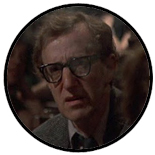
Release date
7th February 1986
Studio
Orion Pictures
Duration: 82m
US Rating: PG
Rotten Tomatoes 93%
IMDB: 8
Roger Ebert: 4/4
US Box office: $40,084,041
US Adjusted Box Office: $92,146,100
Cast
Woody Allen plays Mickey Sachs. Although he did consider playing Elliot and Frederick.
Michael Caine plays Elliot. Caine has, of course, enjoyed a long career, starting in the 60s as a star in swinging London films like Alfie (1966) and The Italian Job (1969). He was a huge star in the throughout the 80s. He has started in modern blockbusters such as the Batman films, and other works by Christopher Nolan. Caine was a good friend of Mia Farrow’s, and introduced her to Allen. Says Allen[1]:
“Michael was originally an idea of mine, because I’ve always been a great fan of his. He’s one of the few people around who can play serious and comedy. There’s not a lot of us around!”
Despite winning an Academy Award for his performance, Caine has mentioned many times he didn't have much fun on set, being so close to the actual lives of Allen and Farrow. Caine also seems to have been annoyed that Allen never gave him a close up.
Allen had initially wanted Jack Nicholson for the role, and discussions took place, but he passed in the end.
Mia Farrow plays Hannah. This is her fifth time working with Allen, and the pair were romantically involved at the time. Allen had given Farrow the choice to play any sister she wanted. She chose Hannah, although Farrow found the character's dichotomies difficult. Says Allen[7]:
“At times, I didn't think she was nice, and at other times I did. Mia was always looking to me for guidance and I could never give it to her. I could just say to her, 'Well, play this scene and let me see as you play it instinctively and maybe I can change something.' But I'm in the dark a lot of times that way.”
Before Farrow, Kim Basinger, Jessica Lange, Jennifer Jason Leigh, Kay Lenz and Annie Potts were amongst those considered for the role.
Carrie Fisher plays April Knox. This was just a couple of years after she completed her role of Princess Leia from the Star Wars films. She would appear in several great comedies in the 80s, notably When Harry Met Sally (1988). Brooke Shields, who had her scenes cut from Annie Hall (1977), was considered for this role.
Barbara Hershey plays Lee. She had some roles in Hollywood, but this film was the start of a strong period for Hershey, following it up with acclaimed performances for Shy People (1987) and Beaches (1988). She had only recently moved to Manhattan and met Allen on her third day in the city. Says Hershey[8]:
“I just fell in love with the role and I came in with lots of wonderful ideas that Woody didn't like and I had to just let go of them. Because I realized what's the point of doing a Woody Allen movie unless you're going to do it his way, unless you're going to see where he takes you. And as soon as I gave myself to him as an actor, it was great. I relaxed.”
Lloyd Nolan plays Evan. It was the final role for the character actor who appeared in over a hundred performances. He starred in the TV series Julia as well as films like Peyton Place (1957). He died before this film was released.
Maureen O’Sullivan plays Norma, the mother of the sisters. In real life she is Mia Farrow’s mother. She had many film roles including The Thin Man (1934) and playing Jane in the Tarzan films of the 30s. Says Allen[1]:
“Maureen was the natural choice: she was available, she’s Mia’s mother in real life, and she can act. That fell in naturally. It would be hard for me to cast the part of Mia’s mother without casting … well, Mia’s mother, who’s an actress and right there!”
Daniel Stern plays Dusty Frye. Stern had a small role in Allen’s Stardust Memories (1980). Since then he had a memorable role in Diner (1982) and would go on to star in the City Slickers and Home Alone films. Says Stern[9]:
“It was me, Michael Caine, Max Von Sydow, and Woody Allen all at lunch that day. We’re at one of these downtown restaurants, and—that’s something I’ll never forget. I mean, who does not belong at this table? [Laughs.] So I just shut up and listened to the guys regale each other. It was beautiful. I’ve had a lot of lucky experiences in my life, but that’s one of the pinnacles. I mean, Woody Allen? Come on!”
Max Von Sydow plays Frederick. He started his career in his native Sweden, starring in acclaimed films by Ingmar Bergman including The Seventh Seal (1956) and Wild Strawberries (1957). He starred in many American genre work such as The Exorcist (1973) and Flash Gordon (1980). He also had roles in big blockbusters like Star Wars The Force Awakens (2015) and Game Of Thrones. His character was initially called Peter, then later Ken, but Allen changed it for Von Sydow, making it sound more Scandinavian. Says Allen[10]:
“Max is so good, the crew applauds. That never happens for an actor. His gift is so large, it’s universal. Whether he plays sophisticated or unsophisticated, it doesn’t matter.”
Says Von Sydow[11]:
“It was the beginning of a very nice period and I enjoyed very much playing in that film. I was sorry that it didn’t take longer, but I am a great admirer of Woody Allen and I hope he will continue forever.”
Dianne Wiest returns, playing Holly. She would win an Academy Award for her performance. This is Wiest's second film in a row with Allen, and she would work with Allen three more times.
Hannah And Her Sisters
is featured in our book
The Woody Allen Watcher's Guide
Book 1
Mickey Sachs
Woody Allen
Elliot
Hannah
April Knox
Lee
Evan
Norma
Dusty Frye
Frederick
Holly
Locations
- The Langham
- The building David designed
- Lee and Frederick's @ 80 Grand Street
- Restaurant @ 17 West 19th Street
- Sheep Meadow
- Columbia University
- Bookshop
- Mount Sinai Hospital
- CBGBs
Crew
Carlos Di Palma joins our story as cinematographer. He replaces Gordon Willis, and starts a 12 film run working with Allen. It is the longest collaboration Allen would have to date with a cinematographer. Di Palma had worked for many years with Michelangelo Antonioni, including classics likes Blowup (1966), and crewed on Bicycle Thieves (1948). Says Allen[10]:
“Carlo was the opposite of Gordon in that Gordon has prodigious technique in addition to his artistic genius. Carlo was an absolute hunt-and-peck primitive. He would put a light there and look around and try something else, and put a light somewhere else, and somehow arrive at very beautiful lighting. He learned through no schools at all.”
Allen had asked Di Palma to be cinematographer for his very first film, Take The Money And Run (1969). He was unable to do it, but he had kept the telegram from Allen, much to Allen’s surprise.
Stuart Wurtzel returns as production designer, having worked on The Purple Rose of Cairo (1985). It is his second and last film with Allen, and he would earn an Academy Award nomination for his work here. He would continue to work for several more decades in films from 3 Men And A Little Lady (1990) to Marley And Me (2008).
Dick Hyman is back as composer. He arranged and performed new music for the film.
Susan E Morse returns as editor. This is her 7th film with Allen as lead editor.
Juliet Taylor is casting. This is her 9th film with Woody Allen.
Charles H Joffe and Jack Rollins, Woody Allen’s managers, return as executive producers. Robert Greenhut also returns as producer.
Release
Hannah And Her Sisters was released in the US on 7th February 1986. At the time, Down And Out In Beverly Hills was the top of the US box office.
Hannah And Her Sisters played at the 39th Cannes Film Festival, which took place on 8th-19th May 1986. It was the third film in a row for Allen who played at Cannes, and fourth overall. Neither Allen nor any of the cast appears at the festival.
There is no scene in the film resembling the photo on the poster, with all three sisters together. There is however a brief glimpse of a similar photo in Hannah's bedroom.
A soundtrack was released on MCA Records in 1986.
Reception
Hannah and Her Sisters has earned $40,084,041 in the US.
Not adjusted for inflation, this was Allen's most succesful film up to this point, and would remain so until 2005’s Match Point.
Adjusted for inflation, this is Allen’s 3rd highest earning film in the US.
In May 2016, the New York Times presented a live read of this film. It was directed by Olivia Wilde, who also played the role of Hannah. It had a phenomenal cast of Rose Byrne, Bobby Cannavale, Justin Long, Maya Rudolph, Salmon Rushdie, Michael Sheen, Jason Sudeikis and Uma Thurman.
The film was caught up in a small movement to create a Pulitzer Prize for Film, an award that still doesn't exist.
Fans of this film include Mike Birbiglia and Cate Blanchett.
Mad Magazine parodied this film. It was called Henna And Her Sickos.
Awards & Nominations
59th Academy Awards
3 wins from 7 nominations
Best Actor in a Supporting Role, Michael Caine
Best Actress in a Supporting Role, Dianne Wiest
Best Writing, Screenplay Written Directly for the Screen, Woody Allen
- Best Picture
- Best Director, Woody Allen
- Best Art Direction-Set Decoration, Stuart Wurtzel and Carol Joffe
- Best Film Editing, Susan E. Morse
44th Golden Globe Awards
1 win from 5 nominations
Best Motion Picture - Comedy or Musical
- Best Director - Motion Picture, Woody Allen
- Best Performance by an Actress in a Supporting Role, Dianne Wiest
- Best Performance by an Actor in a Supporting Role, Michael Caine
- Best Screenplay, Woody Allen
40th British Academy Film Awards
2 wins from 8 nomination
- Best Direction, Woody Allen
Best Screenplay - Original, Woody Allen
- Best Actor, Woody Allen
- Best Actor, Michael Caine
- Best Actress, Mia Farrow
- Best Actress In A Supporting Role, Barbara Hershey
- Best Editing, Susan E. Morse
- Best Film
Writers Guild Of America Awards
1 win from 1 nomination
Best Screenplay Written Directly for the Screen
What did you you think?
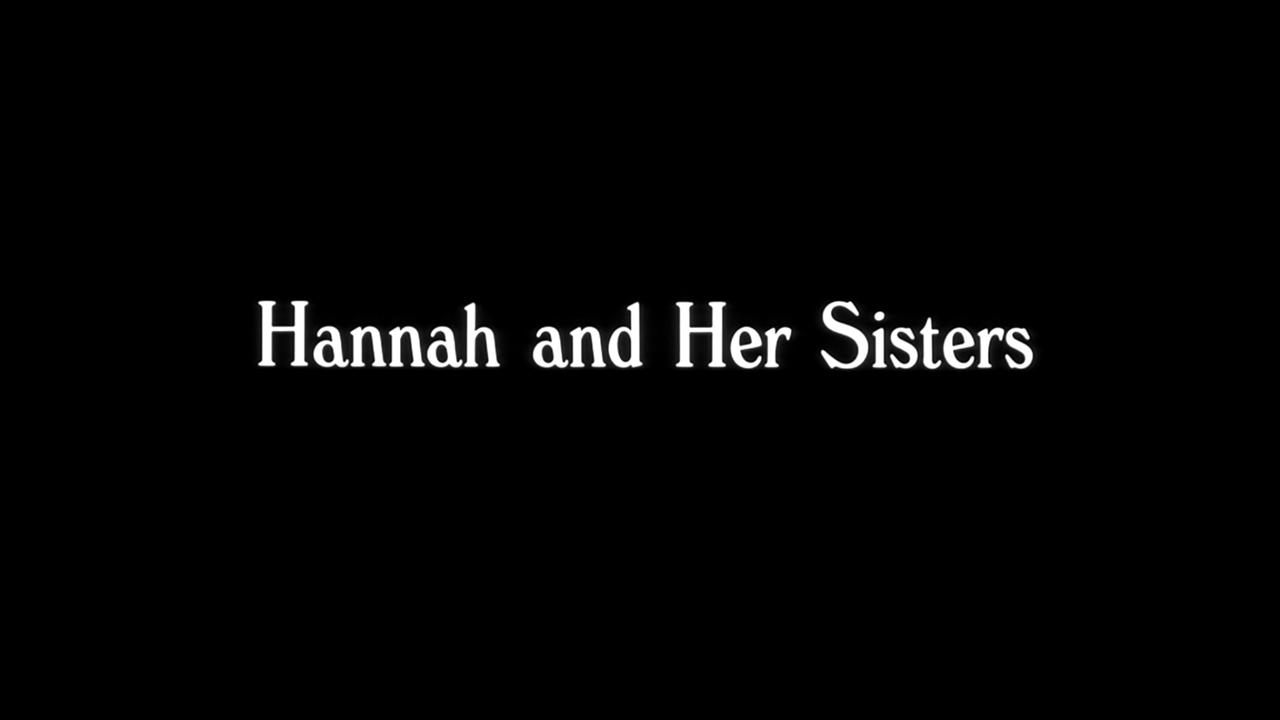
“How the hell do I know why there were Nazis? I don't know how the can opener works!”
“I was gonna kill myself. The only thing that might have stopped me is that my parents would be devastated. I would have to shoot them also, first. And then I have an aunt and uncle - you know - it would've been a blood bath.”
“I had a great evening; it was like the Nuremberg Trials.”
“I'm afraid once they're done singing they're gonna take hostages!”
“With you as her mother, her father could be anybody in Actor's Equity!”
“We don't name names, we say "The Pope"!”
1. Take the Money and Run (1969)
2. Bananas (1971)
3. Everything You Always Wanted to Know About Sex* (*But Were Afraid to Ask) (1972)
4. Sleeper (1973)
5. Love And Death (1975)
6. Annie Hall (1977)
7. Interiors (1978)
8. Manhattan (1979)
9. Stardust Memories (1980)
10. A Midsummer Night's Sex Comedy (1982)
11. Zelig (1983)
12. Broadway Danny Rose (1984)
13. The Purple Rose Of Cairo (1985)
14. Hannah And Her Sisters (1986)
15. Radio Days (1987)
16. September (1987)
17. Another Woman (1988)
18. Crimes And Misdemeanors (1989)
19. Alice (1990)
20. Shadows And Fog (1991)
21. Husbands And Wives (1992)
22. Manhattan Murder Mystery (1993)
23. Bullets Over Broadway (1994)
24. Don't Drink The Water (1994)
25. Mighty Aphrodite (1995)
26. Everyone Says I Love You (1996)
27. Deconstructing Harry (1997)
28. Celebrity (1998)
29. Sweet And Lowdown (1999)
30. Small Time Crooks (2000)
31. The Curse Of the Jade Scorpion (2001)
32. Hollywood Ending (2002)
33. Anything Else (2003)
34. Melinda And Melinda (2004)
35. Match Point (2005)
36. Scoop (2006)
37. Cassandra's Dream (2007)
38. Vicky Cristina Barcelona (2008)
39. Whatever Works (2009)
40. You Will Meet A Tall Dark Stranger (2010)
41. Midnight In Paris (2011)
42. To Rome With Love (2012)
43. Blue Jasmine (2013)
44. Magic In the Moonlight (2014)
45. Irrational Man (2015)
46. Café Society (2016)
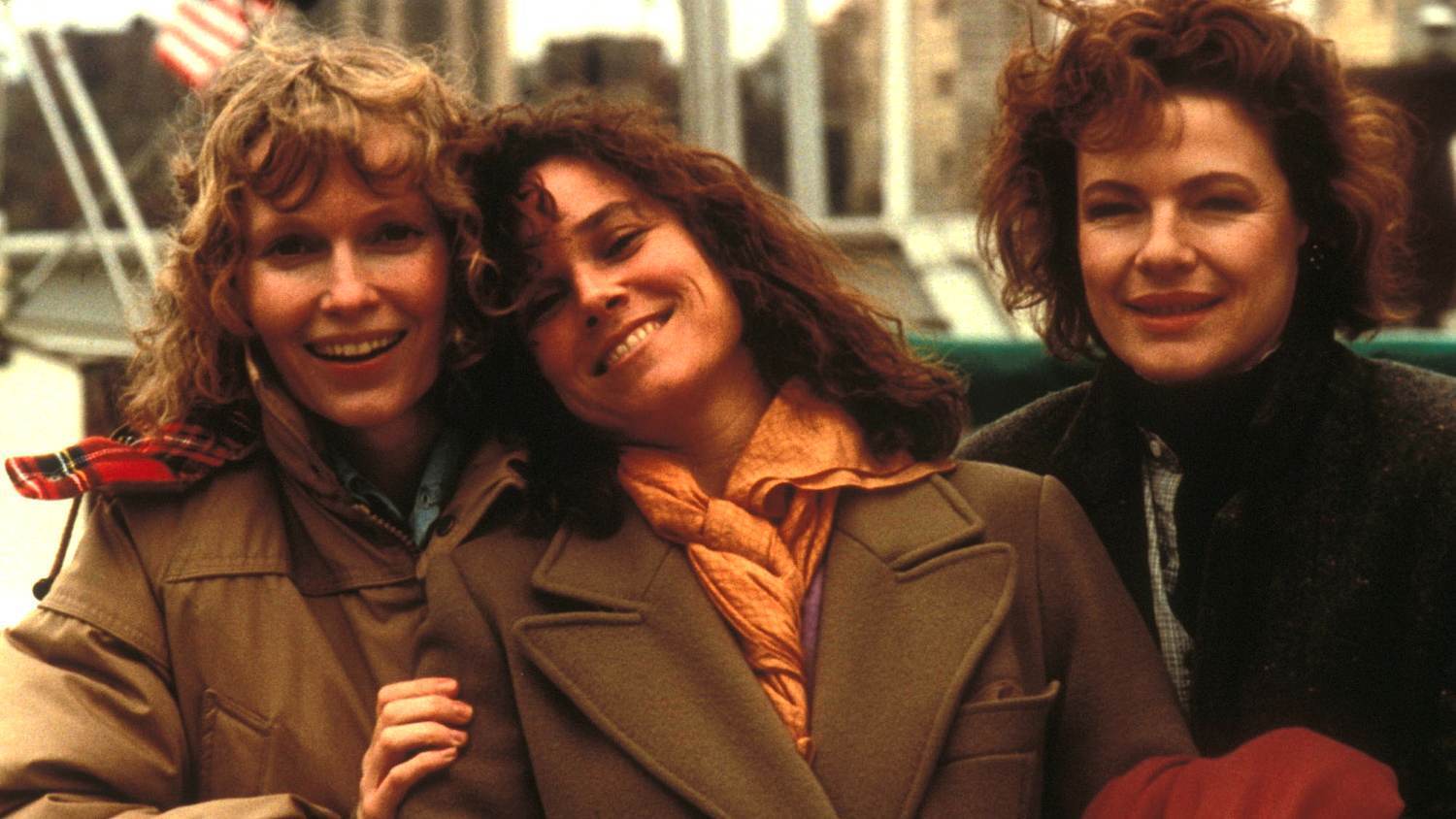

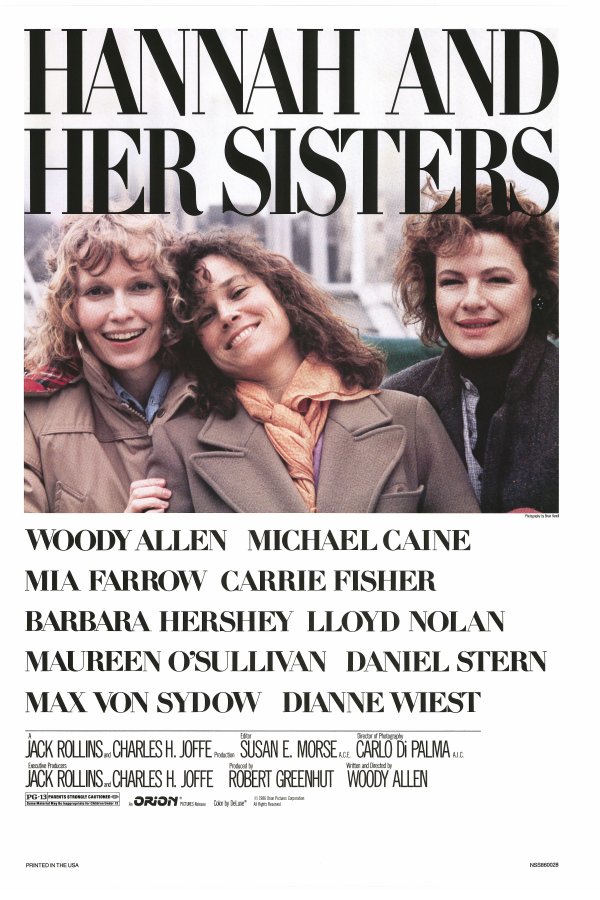
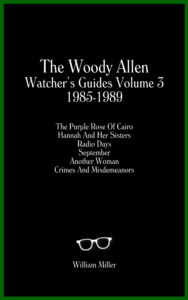
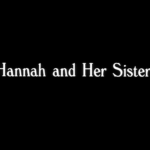
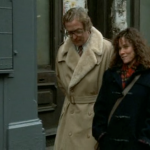
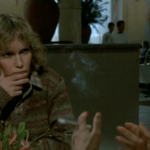
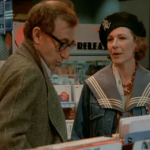
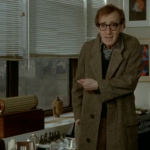
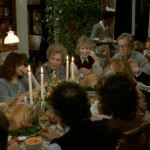
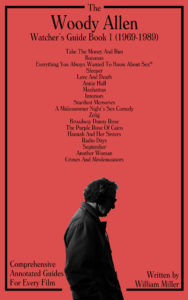
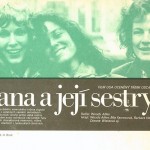
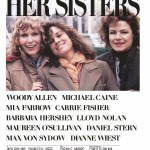

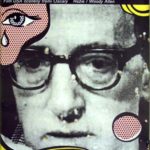
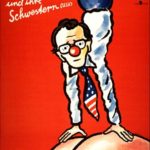
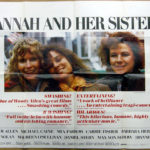
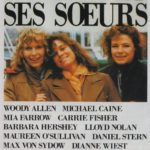
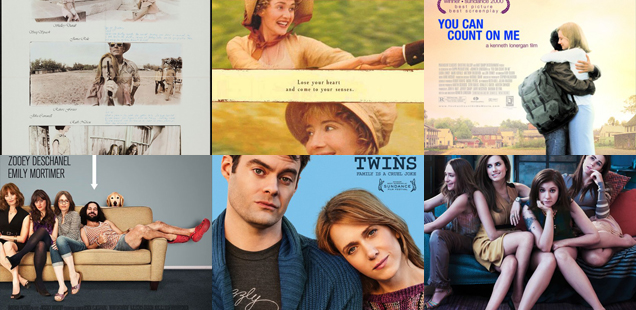
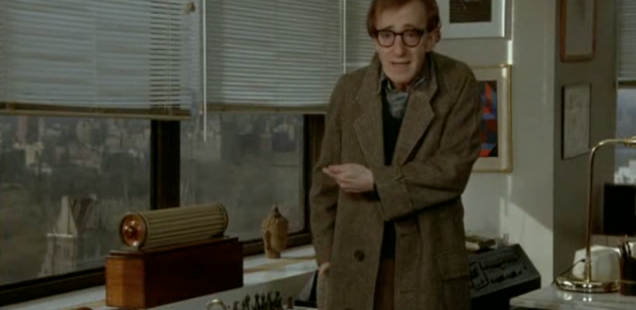
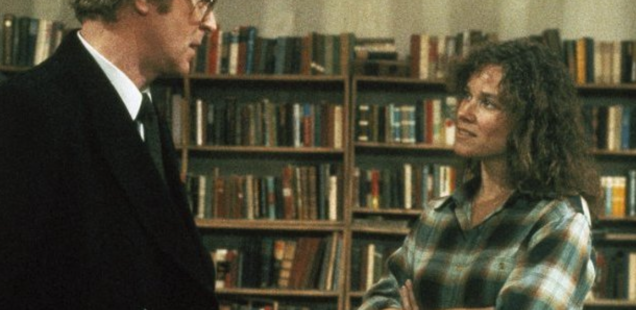
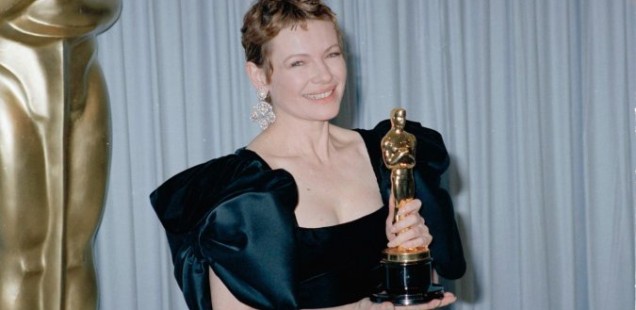
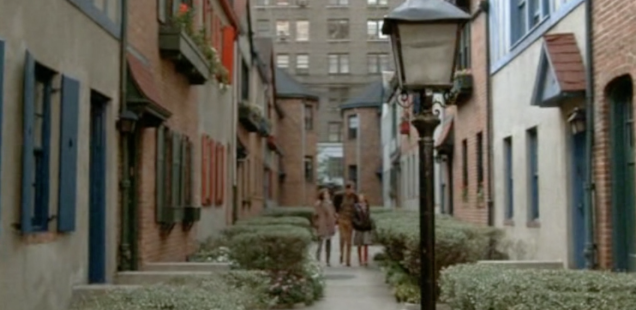
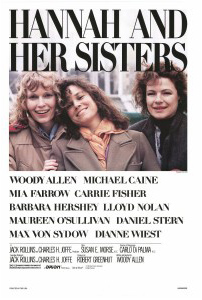

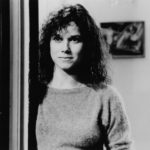
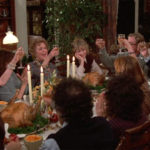
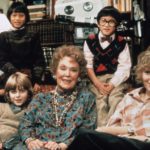

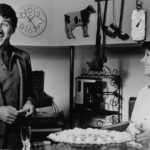
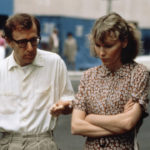
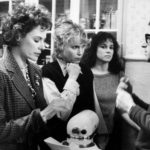
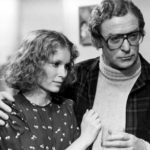
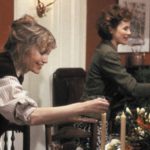
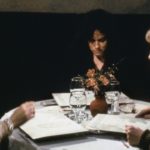
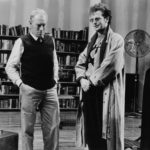
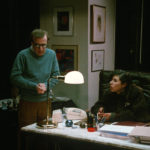
3 Comments
The scene with Woody Allen contemplating suicide while watching the Marx Brothers Duck Soup saved my life more than once.
Which stereo system (receiver and turntable) plays Bach BWV 1056, second movement?
I always saw the ending of ‘Hannah and her sisters’ as a happy ending, and knew the story that Woody always says: that he didn’t earn the dramatic ending he had in mind so he changed direction a little bit at the last moment to make it less downbeat. However, watching it after a while now I realize the ending is not as happy as I thought, and at least this time that I’ve seen it I feel not every problem is solved for the characters by the end of the movie.
Elliott says that he’s glad his thing with Lee didn’t work out and he’s realized he is happy with Hannah, but his face and his voice do not match those words. I don’t think he’s that happy and he doesn’t seem to have solved the issues with Hannah that might have made him have that fling with Lee in the first place. Also at the dinner party he comments on Lee and her new husband and how happy she seems, but at the end of the day she is not less lost that she was at the beginning; she’s married but she’s still completely lost. Before, Elliott was telling his analyst he felt Lee had no direction and that she “was taking courses in Columbia, but randomly”. Now she has a husband, but she’s still depending on a man for money and hasn’t found what she wants to do in life. Mickey tells himself life is worth living because he saw a Marx Brothers’ film but I feel that might not be a good enough reason for him to really embrace life. I think they are all just conforming. And Hannah is oblivious about her husband’s infidelity with her sister, and even though she seems happy to have Elliott by his side at the end of the film, she’s still supporting most of her family economically and emotionally with little in return. No one really thanks her for being the backbone of the family. She said she had “enormous needs” but her husband didn’t really ask her what those were, and when she said “it’s all pitch black tonight” lying in bed Elliott kissed her, but he’s too self absorbed with his issues to really be as supportive as she’s asking him to be. Maybe Holly is the only one that manages to discover her place. She finds out she’s a talented writer and produces a script that everyone responds very well to, and also marries Mickey.
I always interpreted Mickey and Holly’s last scene, when she says she is pregnant, as a magical reward on them because of her success and he deciding to give life a chance after all. It’s almost a miracle because he thought he was infertile. And maybe that’s really what happens, but if I think more realistically that’s probably not his child and they are not the happy couple they want to give the impression they are. I think this becomes an important theme in the movie, because after all, it’s a family of actors and these characters go along through life playing part; happy on the surface but maybe by the end everything is not as resolved as they are telling us it is.
Maybe Woody regretted that he didn’t fulfill the tragic ending he had in mind, but I think he really succeeded in making a more balanced movie that ends emotionally on a good note, and that pleases you, while at the same time being quite bittersweet without being too exaggeratedly dramatic. Anyway, really good film!